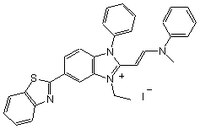124011 Sigma-AldrichAkt Inhibitor IV - CAS 681281-88-9 - Calbiochem
Akt Inhibitor IV, CAS 681281-88-9, is a cell permeable, reversible inhibitor of Akt phosphorylation that targets the ATP binding site of a kinase upstream of Akt, but downstream of PI 3-K.
More>> Akt Inhibitor IV, CAS 681281-88-9, is a cell permeable, reversible inhibitor of Akt phosphorylation that targets the ATP binding site of a kinase upstream of Akt, but downstream of PI 3-K. Less<<お勧めの製品
概要
| Replacement Information |
|---|
主要スペック表
| CAS # | Empirical Formula |
|---|---|
| 681281-88-9 | C₃₁H₂₇IN₄S |
価格&在庫状況
| カタログ番号 | 在庫状況 | 包装 | Qty/Pk | 価格 | 数量 | |
|---|---|---|---|---|---|---|
| 124011-1MGCN |
|
ガラスビン | 1 mg |
|
— | |
| 124011-5MGCN |
|
樹脂アンプル | 5 mg |
|
— |
| Description | |
|---|---|
| Overview | A cell permeable and reversible benzimidazole compound that inhibits Akt phosphorylation/activation by targeting the ATP binding site of a kinase upstream of Akt, but downstream of PI 3-K. Shown to block Akt-mediated FOXO1a nuclear export (IC50 = 625 nM) and cell proliferation (IC50 <1.25 µM) in 786-O cells. Unlike phosphatidylinositol analog-based Akt inhibitors (Cat. Nos. 124005, 124008, 124009), this inhibitor does not affect PI3K. A 10 mM (1 mg/163 µl) solution of Akt Inhibitor IV (Cat. No. 124015) in DMSO is also available. |
| Catalogue Number | 124011 |
| Brand Family | Calbiochem® |
| References | |
|---|---|
| References | Kau, T.R., et al. 2003. Cancer Cell 4, 463. Selected Citations Lee, J., et al. 2009. Cell Stem Cell 5, 76. |
| Product Information | |
|---|---|
| CAS number | 681281-88-9 |
| ATP Competitive | N |
| Form | Yellow solid |
| Hill Formula | C₃₁H₂₇IN₄S |
| Chemical formula | C₃₁H₂₇IN₄S |
| HS Code | 2934 99 49 |
| Hygroscopic | Hygroscopic |
| Reversible | Y |
| Structure formula Image | |
| Quality Level | MQ100 |
| Physicochemical Information | |
|---|---|
| Cell permeable | Y |
| Dimensions |
|---|
| Materials Information |
|---|
| Toxicological Information |
|---|
| Safety Information according to GHS |
|---|
| Safety Information |
|---|
| Product Usage Statements |
|---|
| Packaging Information | |
|---|---|
| Packaged under inert gas | Packaged under inert gas |
| Transport Information |
|---|
| Supplemental Information |
|---|
| Specifications |
|---|
| Global Trade Item Number | |
|---|---|
| カタログ番号 | GTIN |
| 124011-1MGCN | 04055977206357 |
| 124011-5MGCN | 04055977205626 |
Documentation
Akt Inhibitor IV - CAS 681281-88-9 - Calbiochem 試験成績書(CoA)
| タイトル | ロット番号 |
|---|---|
| 124011 |
参考資料
| 参考資料の概要 |
|---|
| Kau, T.R., et al. 2003. Cancer Cell 4, 463. Selected Citations Lee, J., et al. 2009. Cell Stem Cell 5, 76. |
カタログ
| タイトル |
|---|
| Akt |
| Biologics 31.1 |
Posters
| タイトル |
|---|
| Human Kinome & InhibitorSelect™ Libraries |
引用
| Title | |
|---|---|
|
|
| データシート | ||||||||||||||||||||||||||||||
|---|---|---|---|---|---|---|---|---|---|---|---|---|---|---|---|---|---|---|---|---|---|---|---|---|---|---|---|---|---|---|
|
Note that this data sheet is not lot-specific and is representative of the current specifications for this product. Please consult the vial label and the certificate of analysis for information on specific lots. Also note that shipping conditions may differ from storage conditions.
|











